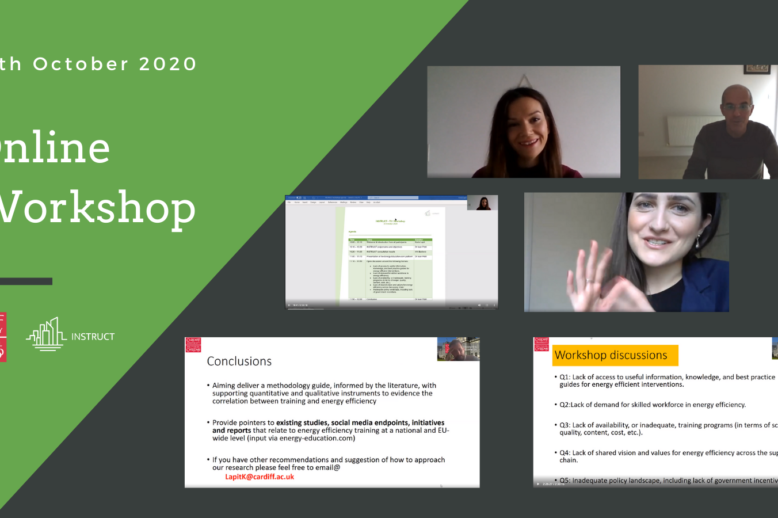INSTRUCT workshop conclusions
On October 30th, we organized an online workshop, closely related to our research which highlighted evidence that corroborates and reinforces the correlation between education, energy performance and quality. The event gathered 19 participants from the UK, Serbia, Italy and Finland.
The workshop was led by Karla Lapit, Dr Ioan Petri, Yacine Rezgui and Irini Barbero from Cardiff University. The aim was to gather feedback on the results of a recently conducted survey on the topic mentioned above.
The discussion focused on the following topics:
- Lack of access to useful information, knowledge, and best practice guides for energy efficient interventions.
- Lack of demand for skilled workforce in energy efficiency.
- Lack of availability or inadequate training programmes (in terms of scope, quality, content, cost etc.).
- Lack of shared vision and values for energy efficiency across the supply chain.
- Inadequate policy landscape, including lack of government incentives.
Based on the experiences of individual participants, we came to some interesting conclusions:
- Sharing initiatives and information about projects which have already collected data about the policy overall landscape in the EU countries and about the governmental incentives within is needed to go further in our plans.
- Adequate policy landscape, government initiatives and understanding of a problem is needed.
- Reward system for workers is needed. Incentive-based systems would be an interesting solution.
- Onsite training will help to eliminate lack of accessibility to energy-efficiency trainings issue.
- There should be relevant trainings planned for particular worker position.
- We should share the knowledge about energy efficiency among investors to arouse demand for skilled workers.
- Adoption of new technologies such as ICT and Artificial Intelligence can be identified as a contributor or accelerator for methods and instruments to deliver skilled workforce for energy efficiency.
- Less theory-based trainings and more practical trainings with a direct link to the work tasks are needed to plan.
The discussion is not closed. If you missed the workshop you can still have an input what will be much appreciated!
All methodology guides, informed by the literature, with quantitative and qualitative instruments to evidence the correlation between training and Energy efficiency are welcome to share via e-mail to Yacine Rezgui from Cardiff University: RezguiY@cardiff.ac.uk.
You can also provide pointers to existing studies, social media endpoints, initiatives and reports that relate to energy efficiency at a national and EU-wide level (input via energy-education.com).
If you have other recommendations, please feel free to contact us via e-mail given above.


